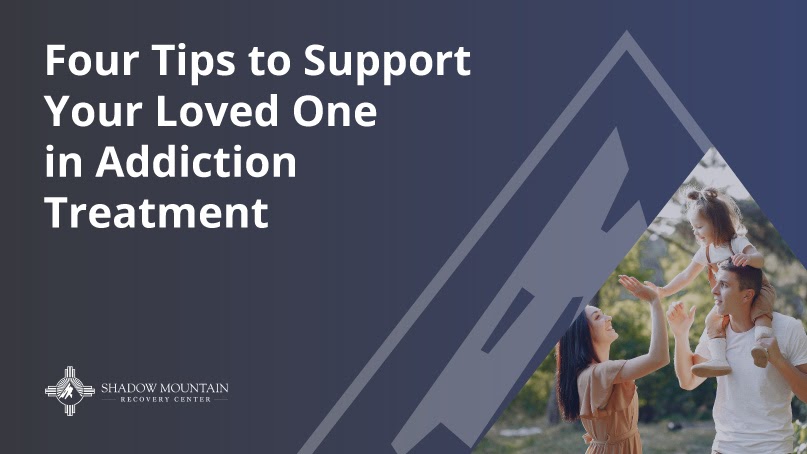Four Tips to Support Your Loved One in Addiction Treatment
In researching addiction treatment, you will consistently read about how a person’s first step into treatment is likely the hardest step.
It’s true because it takes a huge amount of courage to admit it’s time to get help.
You’ll also hear about the relief felt by the person’s loved ones. What isn’t mentioned enough is the stress felt by the people who love the person in treatment.
Many have a feeling of helplessness, while others feel like they don’t want to do anything that might put their loved one at risk of relapsing or lapsing.
You are an important piece in your friend’s or family member’s recovery. It is worthy of applause that you are taking time to learn ways to help them.
Here are some ways you can show your support for your loved one who is in treatment or recently graduated from treatment for substance use disorder.
Tip #1: Encourage Them to Stay in Treatment and Aftercare
It’s tough to not have someone you love, and possibly see every day, not around. It can cause depression, anxiety, and more.
You must not let those feelings get in the way of the work your loved one is putting in. Their life is on the line.
In the times you want to pull them out of treatment or give in to their desire to leave treatment, remember what life was like before they went in. There were reasons treatment was needed.
Your loved one is going to need your continued support throughout this journey.
A great way to encourage them to stay is by giving them firm but friendly reminders of why they’re in treatment and how it’s going to lead to a better future.
Treatment for addiction isn’t always easy, and there may be moments of weakness that leave your loved one wanting to give up and go home. Don’t give in to it easily. Instead, be prepared to turn them back toward treatment with words of encouragement and love.
Tip #2: Take Advantage of Family Therapy
At many treatment centers, like Shadow Mountain Recovery, family therapy is an important part of the recovery and treatment process.
Families are incredibly complex. There are constantly shifting dynamics and feelings, and dealing with addiction in a family speeds up and breaks down a lot of the moving parts.
Family therapy works to rebuild relationships by having members break down their sides of the story of addiction within the family. By putting everything out on the table, relationships can truly begin to reform.
Family therapy is hard for everyone involved, but you must take part and show up to these meetings to show your commitment to their recovery.
The old saying “showing up is half the battle” stands true here.
This tip also will help in fulfilling your first tip of giving words of encouragement to your loved one.
Tip #3: Support Your Loved One by Writing Them Letters
Your loved one being a little farther away geographically is not uncommon in treatment. If this is the case and you cannot possibly make it to family therapy every week or session and cannot speak with them daily, writing letters is a great way to send a message.
In the days of instant messaging and cell phones, the art of taking time to handwrite letters has become lost.
Regardless, taking the time to send a handwritten letter or note to your loved one shows your commitment.
Sharing positivity and support for them in your letters can only strengthen your loved one’s chances of recovery.
Tip #4: Create a Peaceful Transition for Aftercare
Entering treatment can be pretty scary. Leaving treatment isn’t always scary, but it can be. After weeks of effort put into recovery from addiction, returning to life outside of treatment might have a few (or more) big challenges to confront.
If you take the time to create a peaceful and healthy transition for them, recovery is easier when they return home.
You can do this in a few ways.
- Encourage sobriety
- Keep substances, such as alcohol, away from them. This doesn’t mean treat them like a child. It’s more about helping them avoid potentially difficult situations that include the substance.
- Help them build coping skills
- This begins in treatment with a therapist and should continue past their stay in a facility. You can help as well. When stressful situations arise, help them turn to something other than that substance.
- Encourage them to continue visits to support groups and treatment
- This goes hand in hand with Tip #1. After treatment ends, it’s important your loved one not put treatment in the rearview mirror. It helps for them to stay accountable with others who are facing similar challenges.
Support Loved Ones Attending Shadow Mountain
When a family member or close friend enters treatment, you can feel lonely or confused.
We hope this blog helps you know what to do to help out your loved one in treatment.
If you are still hoping for your loved one to find treatment to begin with, Shadow Mountain, located in New Mexico is prepared to help.
Call us at 505-657-2117 for more information.









